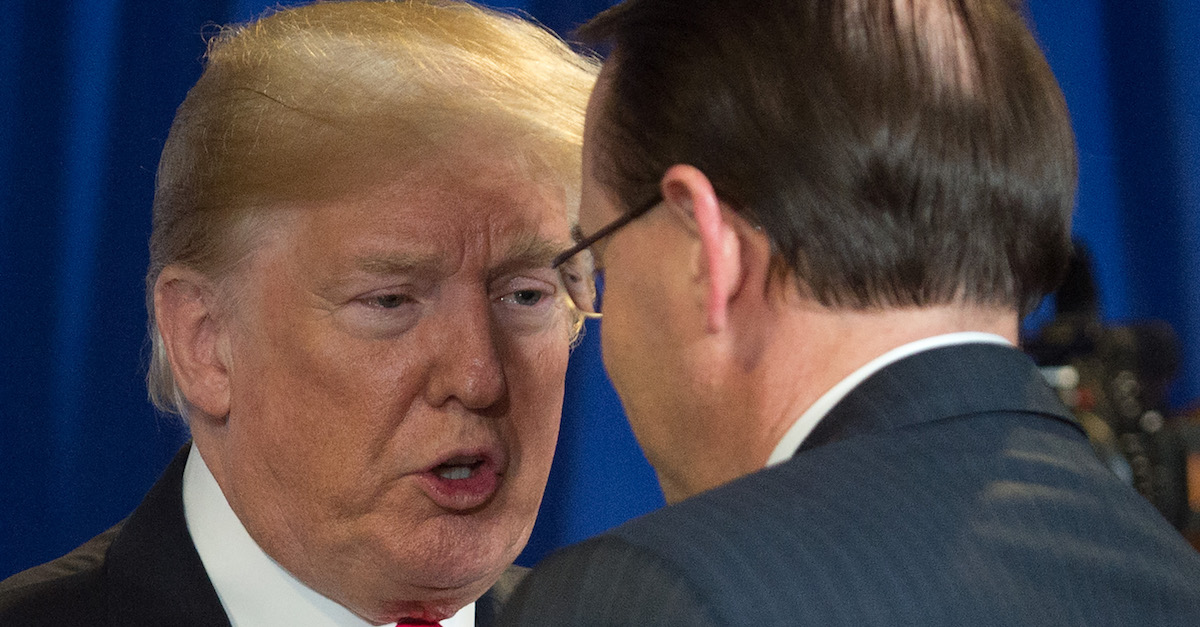
The New York Times once again finds itself at the center of controversy after publishing a story that claims Deputy Attorney General Rod Rosenstein discussed wearing a “wire” to secretly record President Donald Trump and discussed getting cabinet memebers to remove Trump from office through the 25th Amendment.
Law&Crime already mentioned some of the immediate questions being asked about the report, including those wondering whether the Times was duped into publishing something that Trump could use to derail special counsel Robert Mueller‘s Russia investigation. Rosenstein appointed Mueller as special counsel in May 2017.
One of the strongest indications that Rosenstein was telling the truth when he said the story was “inaccurate and factually incorrect” is that he’s certainly smart enough to know that removing Trump through the 25th Amendment is not as easy a route as the impeachment process.
Politico reporter Josh Gerstein cited a former DOJ official who said that Rosenstein had to have been joking about the 25th Amendment. That person said Rosenstein knows the law and wouldn’t have seriously suggested resorting to the 25th Amendment.
Gerstein then referred to previous reporting, in which he quoted Sen. Birch Bayh‘s (D-Ind.) ex-chief of staff Jay Berman, a man “who helped craft the amendment in the 1960s.”
Berman explained that the vagueness in the language — “unable to discharge the powers and duties of his office” — makes it harder to prove that Trump could be removed on grounds that he is mentally incapable of fulfilling his duties as president.
“The answer is not provided in the 25th Amendment […] It just does not provide that certainty or specificity. That might be easier in the context of physical incapacity, but it would be a lot harder in the case of mental incapacity,” Berman said.
It’s unlikely that Rosenstein, the Deputy Attorney General of the United States, would be unaware of this. Or put another way — it’s more likely that Rosenstein would knowingly joke about this than be ignorant of constitutional law.
This gives some credence to the comment pushed by an unnamed DOJ spokeswoman, who said that Rosenstein’s “wire” remark was sarcastic.
This was, of course, disputed by the Times‘ sources who were discussing Rosentein’s remarks. They believed he was serious about the idea and said he suggested FBI officials could also secretly record the president. The Washington Post pushed back on that, however:
While McCabe’s memos assert both the recording and 25th amendment conversations occurred at a meeting within days of Comey’s firing, another person at the meeting, speaking on condition of anonymity to discuss internal deliberations, insisted the recording comment was said in a moment of sarcasm, and that the 25th amendment was not discussed.
That person said the wire comment came in response to McCabe’s own pushing for the Justice Department to open an investigation into the president. To that, Rosenstein responded with what this person described as a sarcastic comment along the lines of, “What do you want to do, Andy, wire the president?”
That person insisted the statement was never discussed with any intention of recording a conversation with the president.
People who were in the room, according to the Post, said the “wire” recording was a joke and that the 25th Amendment was not mentioned. Lisa Page — yes, that Lisa Page — wrote a memo of her own about the meeting and didn’t mention the 25th Amendment.
Still, Times reporter Adam Goldman is defending the reporting.
Chairman of Citizens for Ethics in Washington (CREW) Norm Eisen said he’s known Rosenstein for more than two decades and believes him when he says that the Times report was “inaccurate” and “factually incorrect.”
https://twitter.com/NormEisen/status/1043216825818009601
Instead, Eisen suggested, “there are indicators this is revenge effort” by fired FBI Deputy Director Andrew McCabe. We don’t know if that’s true, but we do know that McCabe’s memos were cited as proof that Rosenstein said what the Times reported.
McCabe’s spokeswoman Melissa Schwartz denied that anyone associated with McCabe or his team “shared, read, described, whispered or blinked in Morse Code any part of his memos with any reporter.”
National security lawyer Bradley P. Moss suggested that, if anything, Rosenstein’s 25th Amendment remarks sound like “frustration” rather than a “serious and dedicated effort to pursue the option.”
CNN legal analyst and former Southern District of New York U.S. Attorney Preet Bharara said he also has known Rosenstein a long time and knows him to be a “sarcastic guy.”
“Jokes about wiring people up are as common with prosecutors as knock-knock jokes in grade school,” he said.
Michael Warren, senior writer at the Weekly Standard, says a former DOJ official told him such joking would be “100 percent in character” for Rosenstein.
https://twitter.com/MichaelRWarren/status/1043235708264165376
All of this, while not definitive, does cast doubt on the idea that Rosenstein was being serious when he said these things.
[Image via Image via SAUL LOEB/AFP/Getty Images]